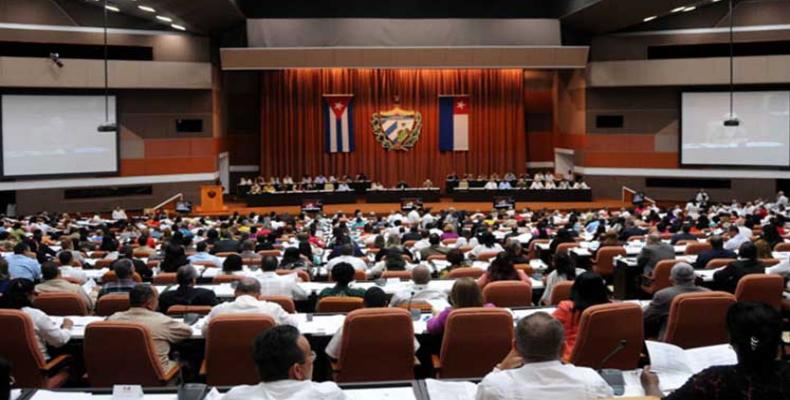Cuban National Assembly to elect executive branch of government
By Charles McKelvey
On October 10, the Cuban National Assembly of Popular Power will elect the President, Vice-President and Secretary of the Assembly, who also will serve as President, Vice-President, and Secretary of the Council of State. The National Assembly also will elect the other members of the Council of State, which is the organ that represents the National Assembly between its sessions. In addition, the National Assembly on October 10 will elect the President of the Republic, who is the head of state, and the Vice-President of the Republic. Once elected, the President will present to the National Assembly, either at that same session or the next, the Prime Minister and the other members of the Council of Ministers.
The National Assembly of Popular Power is the legislative branch of the Cuban government, while the President, Vice-President, Prime Minister, and the Council of Ministers constitute the executive branch. In granting the National Assembly the authority to elect the executive branch, the Cuban Constitution establishes the National Assembly as the highest authority in the nation. At the same time, the Constitution establishes the President of the Republic as the highest member of the executive branch.
The National Assembly of Popular Power was established as the highest authority in the nation by the Cuban Constitution of 1976, and this quality was preserved in the Constitution of 2019. The new Constitution was approved by the people in referendum on February 24, following an extensive popular consultation, by 87% of the voters, with a voter participation rate of 84%. While preserving the authority of the National Assembly, the new Constitution introduced some administrative structural reforms, which establish a greater integration between the National Assembly and the Council of State, and a greater separation between the Council of State and the Council of Ministers, which are reflected in the upcoming October 10 elections, the first elections held under the new constitution.
The deputies of the National Assembly of Popular Power are elected by the delegates of 169 municipal assemblies, who have been elected by the people in more than 12,000 small voting districts throughout the country, where the people cast secret votes for one of two or more candidates that have been placed on the ballot following a series of neighborhood nomination assemblies. Since the system was established in 1976, the voter participation rate in the elections to the municipal assemblies has ranged from 85 to 95% of the population of voting age, 16 years of age or older.
The National Candidacy Commission plays an important role in the October 10 elections. The Commission conducted interviews with the deputies of the National Assembly from September 18 to September 22, in order that the Commission would know of the deputies’ preferences for the offices of President and Vice-President of the Republic and the officers and members of the Council of State. On the basis of this consultation, the National Candidacy Commission will submit a list, with a name for each position, to the National Assembly for its consideration in the October 10 elections. The National Candidacy Commission consists of representatives of the mass organizations of workers, neighborhoods, women, farmers, and students; all of the representatives on the Commission are designated by the mass organizations themselves, all of which are characterized by internal democratic structures, in which direct elections are held at the base, with indirect elections for higher positions of authority in the organization. I always have interpreted the important role of the mass organizations in electoral as well as legislative processes to be a reflection of the Cuban desire that government officials, once elected, do not start acting like politicians.
The Communist Party of Cuba also plays an important role in the Cuban political process. As the educator of the people, it frames and influences public debate. However, the Party does not participate as such in the electoral process. It does not nominate candidates to the municipal and national assemblies or the executive branch. If it wants to propose a law, it has to submit the law to the National Assembly. In addition, membership in the Party is not required to be elected as a delegate to a municipal assembly or a deputy of the National Assembly.
As the Cuban political process has evolved over the years, it has generated political stability as well as high-quality public debate that leads to consensus with respect to issues of importance to the people and the nation. The process is aided by the fact that the elections to the municipal and national assemblies do not have campaigns like those of the representative democracies. Without the need to attain the support of large campaign contributors to sustain their political careers, the delegates and deputies are free to attend to the needs of the people and the nation. As a result, public debate is not distorted by particular vested interests and the politicians who represent them.
U.S. political leaders arrogantly have demanded for years that Cuba adopt the structures of representative democracy, without knowing of the alternative structures of popular democracy that Cuba has developed. If the people of the United States were to know of the Cuban process of popular democracy, they would have reason to be envious, because unlike the political process in the United States, the Cuban political process generates responsible debate without conflict, seeking consensus. For its part, Cuba does not ask or expect that the United States adopt its political system or any of its characteristics. It merely insists that Cuba has the right to develop its own political system, in accordance with its sovereignty; and Cuba repeatedly calls for civilized relations with the United States on the basis of mutual respect, in spite of the profound differences in their political processes.


